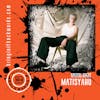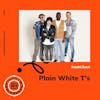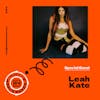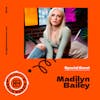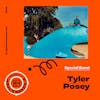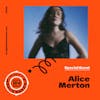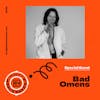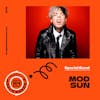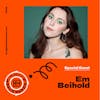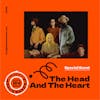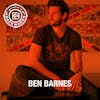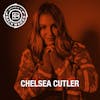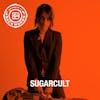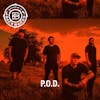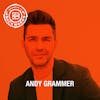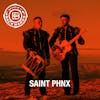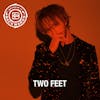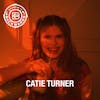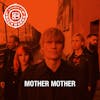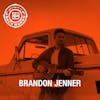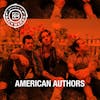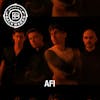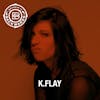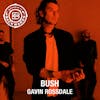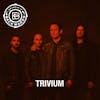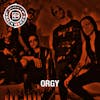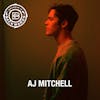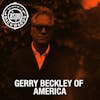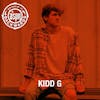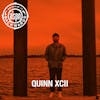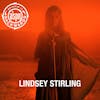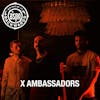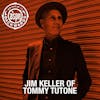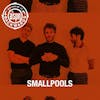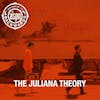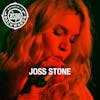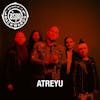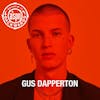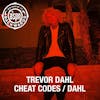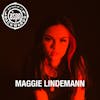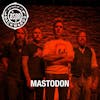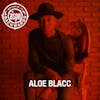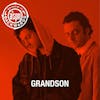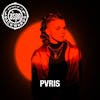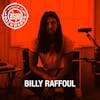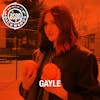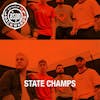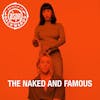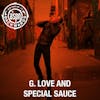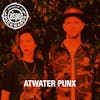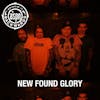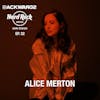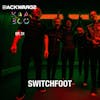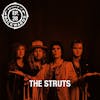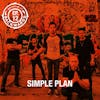Interview with POESY
We had the pleasure of interviewing POSEY over Zoom video.
Canadian Billboard charting goth-pop meets whimsical alt rock artist POESY. Entitled "Still Breathing", the song is the first single off of her forthcoming full length. While the first half...
We had the pleasure of interviewing POESY over Zoom video.
Canadian Billboard charting goth-pop meets whimsical alt rock artist POESY. Entitled "Still Breathing", the song is the first single off of her forthcoming full length. While the first half of the album touches on a lot of life’s anxieties as we move through trauma, "Still Breathing" realizes the power in forging ahead after a challenging time. Paired with punk-rock guitars and a soaring chorus, POESY procroclaims: “cause you’re nothing, and I’m still breathing.”
POESY has received acclaim from Billboard, Nylon, Ones to Watch and was chosen to write the original anthem for the Canadian Games 2022.
POESY is the solo project of classically trained singer, songwriter and pianist, Sarah Botelho. She was discovered after she appeared on the first season of hit Canadian music competition show, THE LAUNCH. Her incredible breakout performance propelled POESY to new heights yet unseen, landing her a major label deal with Big Machine Records and an opportunity to collaborate with esteemed composer and producer Stephan Moccio (Celine Dione, Avril Lavigne) on her debut single ‘Soldier of Love’ . This release charted in the Billboard Top 40 and was followed by a four-track long EP entitled Glass Box Confessional. Her singles “Body Language” and “Strange Little Girl” debuted in the Top 20 at Rock Radio. Classically trained in both singing and piano from the tender age of 4, the musical world has become POESY’s playground, having had vast experience in musical theatre, numerous rock bands and even operatic singing. By pairing inspiration from her favourite novels with an air of vulnerability from her own experiences, POESY unleashes her signature siren sound, filled with big drums & bittersweet melodies. POESY has had the recent honour to write and record an original anthem for Canada Games 2022, which she will perform at the opening and closing ceremonies this summer. Her most recent project - her debut LP I Exist - was made in collaboration with UK producer Stephen Lipson (Annie Lennox, Billie Eilish) and explores themes of betrayal and the journey back to one’s truest self. Her live show is a choir girl gone rogue – with her whimsical outfits and charming storytelling, she commands your attention and pulls you headfirst into every song.
We want to hear from you! Please email Tera@BringinitBackwards.com.
www.BringinitBackwards.com
#podcast #interview #bringinbackpod #POESY #StillBreathing #NewMusic #zoom
Listen & Subscribe to BiB
https://www.bringinitbackwards.com/follow/
Follow our podcast on Instagram and Twitter!
https://www.facebook.com/groups/bringinbackpod
We'd love to see you join our BiB Facebook Group.
Hello! It is Adam. Welcome back to bring it backwards. A podcast where both legendary and rising artists tell their own personal stories of how they achieve stardom. On this episode, we had a chance to hang out with Poesy over zoom video Poesy was born and raised just outside of Toronto, and she talks about how she got into music. Started writing songs in high school, continued that into college. She talked about getting an opportunity to perform on the show, the launch, which was a reality music competition show, which was created by Scott bruschetta, who discovered Taylor swift and is the executive and founder of big machine. 3 (2m 5s): She ended up winning her episode of the show and then release the song soldier of love, which was a song that was given to her on the show. She talked about getting signed to big machine by pretty much presenting Scott shadow with a like plan, okay, I'm going to do this, I've done this. This is my target demo. She made a whole like presentation presented it to them. And she was one of, I think, two people from the show that got signed a big machine. I thought they signed everybody. Nope, only two. And she was one of the two. We talk about putting out her first EAP and then having the pandemic kind of hit months after she put out the record. 3 (2m 46s): She also talks to us about her new record, which she's putting out herself. She was able to get some grant funding through Canada because Canada is amazing when it comes to grants and supporting the arts, you can apply for, for money to help you records and put out your art. So she was able to do this with this new album. We talk about the first single called, still breathing and a lot about the song steel heart, which is a song she wrote for the Canada games, which is like Canada's version of the Olympics. She gets to sing it at the opening ceremony in August and at the closing ceremony, the song's going to be played during all the metal ceremonies it's being used right now to kind of promote the games. 3 (3m 30s): So it's huge, huge for Posey. And she talks about how she was able to get that opportunity as well. You can watch the interview with Posey on her Facebook page and YouTube channel at bringing it backwards. It would be awesome if you subscribe to our channel like us on Facebook and follow us on Instagram, Twitter, and Tik TOK at bringing back pod. And if you're listening to this on Spotify, apple music, Google podcasts, it would be awesome if you follow us there as well, and hook us up with a five star review, 4 (3m 57s): We'd appreciate your support. If you follow and subscribe to our podcasts, wherever you listen to podcasts, 3 (4m 3s): We're bringing it backwards with Poesy. 5 (4m 6s): Hi. 3 (4m 7s): Hi, Sarah. How are you? 5 (4m 8s): Good. How are you? 3 (4m 9s): I am doing well. Thank you so much for doing this. 5 (4m 12s): Yeah, thank you for having me. 3 (4m 14s): Of course. I like your shirt. 5 (4m 15s): Thank you. 3 (4m 18s): Awesome. Awesome. I'm Adam. And this is about you and your journey and music. And we'll talk about the new music coming out and how you got to where you are now. 5 (4m 28s): Super cool. 3 (4m 29s): Very, very cool. So first off I did read you're born and raised you're from Canada, correct. Okay. So talk to me, what part of Canada? And then I saw you learn music at a very early age as well. 5 (4m 40s): Yeah, so I grew up about an hour outside of Toronto and I've lived in Toronto for the past, like five years. So I really love the city. There's like a great music scene here. I live in the west end, like near a really nice park. So there's lots of good nature-y stuff. And yeah, I started piano when I was four. It was kind of like one of those things where like your parents are just trying on different extracurriculars to see which one you like. And I just really loved it. And then I started singing and, and my parents were like, oh, maybe she should take a couple of lessons. And I learned like from a woman who taught like very like classical singer. 5 (5m 23s): So I did a lot of like musical theater and like opera, but then also discovered like classic rock music, like led Zeppelin and wanted to sing and stuff. But I think it, it gave me like a really good foundation for like, understanding how to sing. You know, if you can sing opera, you can say anything. 3 (5m 45s): Right. Right. I mean, wow. Especially in piano that early too. I mean, to learn both of those instruments, kind of like that have the base of music, I mean, right, right away at that. Early on. That's incredible. 5 (5m 56s): Yeah. It's who I always was. I guess 3 (5m 59s): Parents musicians at all. 5 (6m 1s): No, not at all. No one in my family does like any of the arts. So I'm like the odd one out. Like my dad is a police officer and my mom's a real estate agent. So yeah. 3 (6m 15s): So when you, obviously, you, you were into it into playing and singing, like 5 (6m 20s): W 3 (6m 20s): Were you a performer? I was a performer. Like, did you want to be the lead in the musical or whatever you're doing or in the theater or whatever? 5 (6m 28s): For sure. Like I was, so I'm the oldest on my dad's side. And so every year for Christmas I would like get all the younger cousins together and be like, okay, this year we're doing a play. And like, and then I would like direct everyone, obviously give myself the best part. And like, so I just, I was always that person, like, I, I think I grew up like pretty shy, like interpersonally with other people. Like, I didn't really like to talk to anyone, but I also was like, put me on the biggest stage ever, please. That doesn't scare me at all. 3 (7m 1s): So you're very comfortable being on stage and performing people. Interesting. Okay. And what about a band or anything like that? Did you play in band in school or did you play piano in school band? 5 (7m 13s): Yeah, I played, I played a lot of piano in school. Like whenever we would have like assemblies and stuff. And then, like I had a couple bands in high school. I had a band with a bunch of girls I was friends with and we just exclusively covered the Pixies. Pretty weird. And yeah. And then it just kind of progressed. Like when I got to university, then I started like playing my own music. And then I played with like a lot of bands for real and like did the whole playing in the bars and all of that stuff. 3 (7m 42s): Okay. So that was later then. So you, but to be the, where you, like just the best piano player at the school, obviously, it's like, okay, we want her to, we're going to get Sarah to play piano, like during this, this, this assembly or this or that, or the other thing is that you were just the go-to or did you want to be that person? 5 (8m 2s): I think not so much with piano, but with singing, for sure. Like anytime there was anything, I was like, I want to be the one to sing it. And I like, like I sang at our graduation. I like sent, like I say everything. Yeah. 3 (8m 15s): Okay. Yeah. That's cool. What'd you sing at the graduation? 5 (8m 18s): I sang for good from wicked. 3 (8m 22s): Okay. No that's for high school graduation. Yeah. Okay. So you said you were in a Pixies cover band in high school as well. And then were you writing your own music at that time or that didn't start until you went to university? 5 (8m 37s): I don't know if it's started and was very good, but it was definitely happening, but I started writing music when I was like nine or 10. Yeah. And you know, it was, it was like, so like angsty and about so much pain that I had, like never experienced. I think that's what everyone kind of does and gravitates towards. But yeah, when I was in high school, I like used to get in trouble a lot because I would like just write music like in class, like write like lyrics and stuff. And then, yeah, by the time I was in university, I was like writing like quite a lot. 3 (9m 13s): Okay. When you were in high school, did you show the songs to anyone or were you putting together a songs or is it just lyrics? 5 (9m 19s): Sometimes I would show them to people. Like I used to have like a gig where I played at like, so you're based in America. Right, right, right. Yeah. So it was kind of like playing at like a Barnes and noble kind of situation, like a little bookstore. And like every Friday I played at this bookstore and it was like a thing. And like, they, I had like a little like self recorded CD that like they saw up there and like, yeah, 3 (9m 46s): That's cool. So that was all original material. 5 (9m 48s): It was, it was 3 (9m 49s): Okay. How old are you when you're doing this? I'm sorry. 5 (9m 51s): 15. 3 (9m 53s): Okay. Well, tell me about this tape of the songs. Like when did you put that together? 5 (9m 59s): It doesn't exist on the internet anymore. Thankfully 3 (10m 5s): I, 5 (10m 6s): My parents, for sure. I have a copy. It was called the bridge is breaking. And I think there were, there were eight songs on it and 3 (10m 19s): Yeah. I mean, did you just go by your name? 5 (10m 21s): I just went by my actual name. Yeah. This was, this was all pre Posey and it was a little different and like, I dunno, I listened to it like a couple of years ago. Cause my mom had it in a car and I was like, you know what? This is actually pretty 3 (10m 34s): Good. Yeah. 5 (10m 37s): I was like, yeah, it is pretty good for 50 and like some fad. So yeah, it was, it was definitely the beginnings of like, oh, I just want to do this. And I remember I used to think all the time like, oh, I don't know if I could ever be a musician like professionally, because like, what if I, what if I just run out of stuff to write about? And then I can never come up with like an idea again. And what if nothing interesting ever happens to me to write about and then a bunch of stuff did. So it's all good. 3 (11m 4s): So did you put that record together yourself or was that something that you did went to a studio and 5 (11m 11s): I went to a studio in the town where I grew up and recorded it. 3 (11m 14s): It was that like 5 (11m 15s): A really cool, really cool. I think I like didn't. I was like, whoa, I can't believe there's like people that are like helping me record this. This is so weird. But sometimes I still feel like that in my adult life. So I guess I was just really grateful. 3 (11m 32s): And then the bookstore ended up selling the CDs. So you obviously were showing people your songs enough to like, and they were good enough to where this, the store would give you what a weekly time slot and then sell the record. 5 (11m 45s): Yeah. Yeah. 3 (11m 46s): So where your kids from your school show up and, and watch your play or was it kind of a, 5 (11m 51s): Okay. Yeah, it was kind of a thing. 3 (11m 54s): That's really cool. That's awesome. 5 (11m 56s): Yeah. 3 (11m 56s): So you did that and then you go in, this is around the same time you also had the Pixies cover bands. So you're doing two things, but you were writing it. So, and then when you went to university, did you go to do to pursue music? 5 (12m 11s): You know, I probably should have, but I grew up in like, it was like kind of a small town and like everyone was like quite conservative and like traditional. And so I just was like, oh, I can't go to study music. Cause that's not like a real thing. Like I can't, 3 (12m 26s): That's not a real job. 6 (12m 27s): That'd be all 5 (12m 28s): Job. But yeah. So I originally went for sciences and I was like, that's what you do when you're a smart person. And then, and then I hated it. And then I ended up getting a degree in like creative writing. So kind of, kind of adjacent, but yeah, sometimes I wish I had gone from music. Cause I would've loved to like learn how to do all the like technical stuff, like pro tools and like all that. But I think it, you know, it just gave me like a different background. Like I think it made me a better lyricist to like study literature and stuff. 3 (13m 0s): Right, right. I mean, you can learn all of this other things via YouTube or whatever. Right. When it comes to creative writing, it's cool that you were able to get a degree in that. And then obviously I'm sure you had a lot of help or, you know, it's, you can't just watch a YouTube video. Like how do you do creative writing 6 (13m 16s): <inaudible> yeah, 3 (13m 21s): Exactly. Exactly. Exactly. So when you went on the show, the launch, is that a ad? Okay. So I have chatted with Elijah and Jamie who are on the show as well. They might've been on the same season as you and they are great, but I I've heard their story of the show. I didn't know anything about it before chatting with them. This was like about a year or more ago. So I'm curious to hear how you got on the show and then you ended up winning your episode. Is it, it goes by episode, right. Okay. So tell me about how'd you find out about shod? Did you get on the show and what was that like? 5 (13m 59s): It was super random. So it was like right as I was graduating for university and I was kind of like, what am I going to do now? And I got this random Facebook message from this woman who was like, Hey, I saw your cover of a London grammar song. Cause I was like kind of posting YouTube videos sometimes. And she was like, and I work for XYZ company. And like, we want to make a show with Scott Borchetta and we want you to be on it. And I was like, this is spam for sure. 6 (14m 31s): That was my first response. I was 5 (14m 32s): Like, this can't be real. This is so stupid. And then I like 3 (14m 36s): Looked this link 5 (14m 39s): And yeah. So then I like looked the woman up on LinkedIn and like, she really did work for universal and like, it seemed kind of legit. So then I like had a call with her and she told me about the show and I don't think they had even like chosen a yet or anything. And she was like, we'd really like you to be on it. Like, can you submit a tape? And I was like, I don't know. Like, I don't know if like, I'd want to be on a TV show and like, I don't know. And then like, I kind of forgot about it honestly. And then the day that the audition tapes were due, they like messaged me and were like, Hey, we didn't see your submission. Can you like send us something? And I was like, oh, what the heck? So I was like in my pajamas and recorded a video on my phone of me playing zombie by the cranberries. 3 (15m 24s): Wow. 5 (15m 26s): Yeah. In my pajamas. And then also like another original song I had written at the time. And then like a couple days later they like called me and they were like, you're in like, we want you to come to Toronto and like film this show. And then I like got on a train. Cause at the time I wasn't living in Toronto yet and I got on a train and I got there and they like drove me to this hotel. And I like, literally didn't know anything about what was happening. I didn't know, like the structure of the show or the format or anything. And 3 (15m 54s): Then you're going to be on this, on a show. I 5 (15m 56s): Was going to be on a show. Fergie was probably going to be there. And Scott Borchetta and universal were involved and I was like, okay, sure. Let's give the world all I knew. 3 (16m 6s): Okay. 5 (16m 8s): Yeah. And then it was like pretty crazy. Like I think I've always loved music and I've always been like really confident in music. But up until that point, I didn't really have any experience with the industry itself. Like I didn't really, like, I didn't know how you like got an agent or like approach to label or, you know, ran a marketing campaign. Like I didn't have any experience with any of that. I was just kind of like, I love playing shows and I want to do that. So I think that was like, my biggest takeaway from being on the show was like getting to me all these like super high up people in music and kind of like, it was like, I went from like zero to a hundred in the like business terms of it. 5 (16m 49s): And, and that was really cool. And yeah, we, I was only there for like three days I think, filming it. So it was also like really fast. And then I went back to my like regular life for a bit until the show aired and it was weird. 3 (17m 1s): Oh, wow. Okay. So w the way it worked though is you went on the show and you, it was you against somebody else, right. Do like a cover or did you have to do an original song? How, how, what was the structure of the show? Cause by winning, you got to deal with, with a big machine, right? Is that what kind of happened with it? Okay. 5 (17m 20s): So I sang creep by Radiohead as my cover, which was great. And then I also played like an original song. And then they asked me to play like a Florence and machine song. They, they pretty much were just like, and now show us this. And now shows this, none of that stuff like made it end, cause like time constraints. And then, And then I, they chose like a top two. So it was like me and this other guy. And then they show us this song that they've already written, that they want someone to record. And then they were like, you have to make your own version of this. And so I literally listened to the song, like once I think, and then they were like, okay, time to record it. 5 (18m 4s): And I was like, what is even happening right now? And so I took mine into like an Evanescence kind of place. And he, he took his to like a Sam Smith kind of place. And yeah. Then the next day we had to like perform them for like a live studio audience. And I was like, I learned this song yesterday. Yeah. So it was like quite a whirlwind. 3 (18m 27s): Well, how many of you were in the first part of the episode? Like before it became the 5 (18m 32s): Five. 3 (18m 32s): Okay. So when from five and they, what voted, was it like a voting thing? Like, okay, we're going to choose you two or was it, do you just walk back in? They're like, okay. The two you're going to advance. 5 (18m 43s): Yeah. I like, it was like there, the judges choice or whatever, and yeah. Then, then they just called us back in and they were like time to record, But yeah, it was super crazy. It was super fun. And that was actually the first time. So like when I started playing music, because I had always had the piano, I was very much like the kind of person who was like, I could never like be a front person. Like I need to be like back here, like playing the keys for everything. And then the night before the performance, they were like, you have to do it without the piano. And I was like, I don't know, like national television is like the right time to try that, but 3 (19m 24s): We did. Okay. Here we go. 5 (19m 25s): Yeah. And like, honestly, I'm like really glad that that happened because it was so fun. It was like so fun. And you know, I still really like sitting at the piano and playing for shows sometimes, but like, I definitely prefer to like, be like jumping all over the place. So it was cool that I like got to have that experience and like learn this whole other part of like performing. 3 (19m 48s): Sure. And then, so you win and then what you signed a deal with with big machine at the end of the episode or something or at the end of it, 5 (19m 56s): It was like six months later actually. Cause they didn't sign it. They didn't sign everyone who won. 3 (20m 1s): Oh, they didn't. Cause they did sign them. They did sign a lodge in Jamie's. Okay. That was the only reason why I just assumed everyone got sat down winning. Okay. 5 (20m 10s): Yeah, no, I made, like, I made like a 30 page, like marketing proposal of like why they should sign me. And then I sent it to Scott Borchetta and was like, here you go. And 3 (20m 21s): Yeah. Tell me about that. So how did it end? It was just like you won and congratulations. You got the record, soldier love or something like that. 5 (20m 28s): Yeah. And then they were like, we'll be in touch. And then there was like an options period where like we couldn't approach any other labels or anything and we had to wait for them. But yeah. And then I was like, I'm like quite patient person. 3 (20m 44s): I 5 (20m 44s): Was like, I need this now. So yeah. Then I was like, 3 (20m 51s): You put together like a, tell me about this thing you put together to send over there. Cause that's interesting. 5 (20m 56s): Yeah. It was just like, I was just like a deck I guess. And it was like what I thought about my brand. Like what kind of like imagery I wanted to use in the project? Like what kind of fonts I wanted to use, like a breakdown of like all of my like demographics and stuff. And, 3 (21m 13s): Wow. So you went full marketing campaign on this? 5 (21m 16s): Yeah. I was like, I need to show, well, cause like they had signed Taylor swift at the time. Like she was still with them and like I knew that she, 3 (21m 23s): Oh yeah, she she's the reason why she exists. I mean, for the most part. 5 (21m 28s): Exactly. So I was like, they obviously are into that kind of energy. So I wanted to show them like, oh yeah, I, I can do that. 3 (21m 35s): Oh my gosh. That's so brilliant. So obviously you attracted the attention of the, they were like, okay, cool. Let's do this. And then they signed you. And what was that like? 5 (21m 46s): Super crazy. Super crazy. It was crazy because like, you know, since I was nine, I had like done projects at school of like, what do you want to be when you grow up? Right. And like, you know, it was like a moment where I was like, holy shit. I like, I did it. I like got the record deal. It happened. So yeah, it was super cool. I got to go to Nashville a bunch of times I like wrote a couple songs with like Liz rose who like wrote all the early Taylor swift stuff. And like that was like super incredible. And she was really nice and yeah, it was really cool. 3 (22m 15s): Did you put out, is that when you put out glass box confessionals that from that. Okay. And then you put that record out and did they put you on the road or like what? Like to support the album? Like how did the everything change 5 (22m 27s): Once you 3 (22m 28s): Put the album out? 5 (22m 29s): Yeah. I, I did like a little bit of touring when the album came out and then like a couple months later it was the pandemic pretty much. Oh 3 (22m 36s): My gosh. Okay. 5 (22m 38s): Yeah. So then it all got screwed up. 3 (22m 41s): What happens then? Then it's like, okay, I have this record. We didn't have much time to support it. And now there's a pandemic. Like what do you pick up? Like what do you, what do you have to do? 5 (22m 52s): Yeah. I mean, I was like still writing a lot. I did the whole like zoom session thing, which you know, is not really the same. And I was just like trying to stay busy and everything. And then, you know, we kind of both came to a decision that like, it just like wasn't the right fit anymore because like, they didn't really have a lot of other people on their roster that were like me and I, and I think we just like, we couldn't help each other get to the same place that we needed to go. So yeah. And then I kind of like took a second to like reframe how I wanted like the project to go forward and started putting out some stuff by myself. And then I got a grant Canada has like really good grant system for music. 5 (23m 35s): So I got a really nice grant to record the album that I just recorded. And yeah, now it's starting to come out, so. 3 (23m 43s): Wow. Okay. So the pandemic, you guys part ways, and then you're able to, you have to apply obviously to get this grant, which I know is like not the easiest thing ever to, for them to actually give it to you, but the fact that they do that, like I know you Zealand does it as well, Canada and New Zealand, only two I can think of that will actually support the arts like that, which is so cool. And do you have to present to them? I mean, you have to, you have to give them a track record, obviously like, okay, I've done this and this and this, but it's like, you have to say, and here's I have a record. Like, did you have the songs ready? Or like 5 (24m 16s): Kind of have to have it all, like, this is exactly what I'm going to do. Whether or not you give me this grant or not. So you have to be like, I'm going to use this producer. I'm going to go and record it here. I'm going to make this music video. Here's the treatment I'm going to use this marketing firm I'm going to yeah. So it was like a lot of like administrative work, but I'm pretty organized gal. So it was okay. But 3 (24m 39s): Cool. Okay. And did you have the record all done at that point? 5 (24m 43s): No. No. 3 (24m 45s): The record being done. 5 (24m 47s): Yeah. I had the idea of it being done. I had like references for what I wanted it to sound like. And like I had like songs that I had submitted, but I don't think hardly any of them actually ended up on the final record cause I ended up writing other stuff and that was fine and they were cool with it. 3 (25m 3s): Okay. Okay. And so do you start working on what the, the pitch after the pandemic and then when do you start working on the actual record? Like did you have to, did you hear back from them first? And you're like, okay, this is a green light. Let's let's put the record together. You were just working on it 5 (25m 20s): Kind of just like started doing it because I was like, well, I'll figure this out if I don't get the grant. And I'm pretty sure that I will. So it's fine. That was kinda my approach. And yeah. And then I put out a song diamonds and then from that I got contacted by a manager of this amazing producer named Steven Lipson. Who's based in the UK who did like all of Annie Lennox, his stuff. And he had heard diamonds like in some like industry, like email blast or something like that. And he was like, you have to work with Steven. 5 (26m 1s): He really wants to work with you. Like let's set up a call. And then I got to like make this record with him, like via zoom, which was like so crazy. And he's like super talented and like such a lovely person. So that was really cool. 3 (26m 16s): How is it working over zoom? I mean, aside from it being awkward, just because the zoom, but like, do you have to like, is it hard to kind of be vulnerable with this person that you've probably never met and you gotta be like, okay, so we're gonna write a song today about my, no, my feelings. It's just like, it's such a different vibe obviously. 5 (26m 35s): Yeah. And I think also like, you know, there's something about like when you're making a record and you're in the studio and it's all happening very organically. And then someone's like, what if we side chain this? What if we try recording this piece? Like, you know what I mean? And I think like that element was kind of gone because like, it's not like we would just be on zoom the whole day together. Right. 3 (26m 57s): Just like the, the like sporadic ideas like that weren't happening. 5 (27m 3s): Yeah. Like it was a lot more like, okay, here's like this demo that I've made and this is where I want it to go and can you do X, Y, and Z thing? And then he would do it. And then he would call me back and show it to me and then we'd go through it and I'd be like, can we move this here? Can we move that here? So it was like, it was very different and it, it, it was like really cool and I'm really grateful for it, but like, it felt at times like everyone was like, oh, you're recording your record right now. And I was like, it doesn't like super feel like I'm making a record right now. Cause it's like very like distanced and like far away. So I'm excited, you know, we've talked about a lot and like at some point we're going to do something in person now that like you can travel the world again. 5 (27m 47s): But yeah, it was, it was really awesome to work with him. And he had like so much good advice and he's such a talented person. So 3 (27m 54s): When it came to recording your parts, how was that done with, did you record it at your house and just send it over? Like, did you have a engineer studio you were working out of and then sending it their way? Or 5 (28m 6s): I had my friend who I like wrote most of the record with Dijon. He is an engineer here in Toronto and a producer. And so he recorded the vocals and stuff in his studio and then we would like send them over to Steven. So, cause I was like, I do not trust myself to do this myself and like, yeah. So, so that was really cool. And it also just made me be like, wow, technology is so awesome that like none of us even have to be together to do this. So yeah. It was definitely an experience and I feel very like, you know, someday in like 20 years I can be like, I made a pandemic record. 3 (28m 42s): Right, right. Yeah. That's so cool. Like, well how much different was it doing this record? Not only obviously this way via zoom, but like when it came to your ideas and putting stuff down versus the record that you did with big machine where you're writing with that writer that had, you know, written a bunch of material, Taylor swift, did you feel like you had more of a say in this, in this situation or like when you were writing with the other person, was it like, we should just kind of go with what they think because they've had success at one. I mean, did you approach this any differently when it came to that? 5 (29m 16s): I think, yeah. Completely differently. Like, and to the point where like, you know, there were often times where I was like, oh, but like, am I allowed to do this? And then I was like, wait, I'm the boss I'm allowed to do anything. So yeah. I think it was like a completely different process in a lot of ways. And like, which also is a little bit scarier because like then, like if it's not good and people don't like it, it's like, well, I chose all of these things myself this time. And like, this is this wasn't like, oh Sarah, we need this to be top 40 and we need it to have this formula and whatever, whatever this is. Like I decided this is what I wanted the music to sound like. 5 (29m 58s): So I think it's just a lot more vulnerable to be like, this is what I'm actually like with no filters. 3 (30m 3s): Right, right, right. Right. Because yeah, in the other situation you can be like, well, they told me to do that or they, yeah. They wanted it that way. So putting out this music was that, you know, kind of a terrifying thing in the beginning was like, okay, I'm going to put, you've put with three, two, or at least two songs. Right. If not three or it's still, still hard, it's still hard on the new record or on the stillbirth. 5 (30m 27s): No, only, still breathing steel is the theme song for the Canada games. 3 (30m 31s): Oh, I didn't know that. So. Okay. So tell me about that real quick. And then I'll jump back into stillbirth. 5 (30m 37s): Yeah. So about two years ago, I preformed for my parents, neighbors who were like, their kids were fans of mine. And I had gone home for the weekend and my mom was like, can you play them a couple songs? And I was like, yeah, sure. So I like play these two little girls, a couple of songs. And then their dad comes and their dad was like on the planning committee for the Canada games, which is like our precursor to the Olympics kind 3 (31m 3s): Of thing. 5 (31m 4s): And then I guess he went back to work on Monday and was like, look, there's this girl she's kind of local. And like, I think she should sing the theme song. So then they like commissioned me to like write the theme and like record it. And the games are in August now. So it'll play like at the opening and closing ceremonies. And like every time someone gets a metal and like, 3 (31m 25s): Oh, so it hasn't even happened yet. It just happens. You have the song out, but it's not. 5 (31m 31s): And they want it to be out so that it could be used in like their promotional campaigns and stuff like that, leading up to it. But the actual games happen in August. So 3 (31m 40s): That's so exciting. You get to come on and play it. 5 (31m 44s): I do. I play at the opening and closing ceremonies. 3 (31m 46s): Whoa, that's huge. Oh my gosh. Congratulations. 5 (31m 51s): Thanks. Yeah. It was super different. Cause like I'm the least athletic person you'll ever meet. And 3 (31m 58s): They 5 (31m 58s): Were like write something to inspire sports. And I was like, okay, let's do some homework here. 3 (32m 4s): Yeah. Did she do that? Just watched a lot of ESPN or like 5 (32m 9s): Honestly I just tried to think of the most inspirational songs I could think of and then made a playlist of all of them, like, you know, firework by Katy Perry and like all those kinds of, and like a lot of SIA 3 (32m 21s): And 5 (32m 22s): You know, and so I was like, okay, how do I like capture the spirit of this? And then wrote it based off of like, you know, being an athlete is like kind of an impossible dream in the same way that like wanting to become a musician is like an impossible dream. And so I just like took the sports out of it and like wrote from that perspective. And then it was a lot easier. 3 (32m 43s): Did you have to submit a different verb? Like did you submit this, this version that you have now? And they're like, this is it we're going to go with it or did they send notes back? Oh wow. So there's no back and forth. Just here's the song. 5 (32m 55s): There was like pre-production, there was like other, like I think I submitted three songs and then they, they chose one and then we kind of went back and forth, like on what they liked about it. And then once it was recorded, they were like, I love this. This is so great. And then I got to make a music video and all the people in the music video are athletes in the games, which is really cool. 3 (33m 17s): Wow. I did not know that. I figured that I just had to be on the record. That's so awesome. Wow. And then you get to come on, sing it. That's going to be huge. I'm sure has gotta be one of the biggest things ever for Canada as far as like watching. 5 (33m 30s): Well, they had a, they had a, like 200 day kickoff concert, like a couple of weeks ago to be like, the games are happening in 200 days sort of 3 (33m 39s): Thing there 5 (33m 42s): It's not it's every couple years. I'm not sure how many years, but yeah, so they had a, they had a big show and it was at an arena. And so I got to play and I got to play my first arena show. So that was like very cool for me. 3 (33m 54s): Wow. Did you get the headlining? Cause you're the voice of the game. 5 (33m 58s): I didn't get to headline it, but I still got to play and it, 3 (34m 0s): I was just wondering if did you get to come out and play the song where they did, they announce that this was going to be the song for the games 5 (34m 8s): They did. 3 (34m 8s): Wow. That's so awesome. 5 (34m 10s): Yeah, it was really cool. 3 (34m 12s): That's so cool. Now you get to hear your song on all the metals and then obviously sing it twice during the SA I mean the first, the day of, and the closing, like that's so awesome. Congratulations. 5 (34m 22s): Thanks. 3 (34m 23s): Wow. Okay. Well now I'm just still breathing. So that's officially the first one that you've released from the record. Okay. So tell me about that song. Why'd you choose that to go first? 5 (34m 36s): Honestly, it was, it was a lot more of like a personal reason why I chose it to go first. Like it wasn't in the running at all to be the first single. It was more like, I felt like it had to come first because I wrote it. I mean, the song is about like overcoming like a lot of like bad shit. Right. And so like I wrote it because I had been in this relationship with someone who was like formally like in my band and they were really awful to me and like really had like put me down a lot. And like, it just was like a really toxic, bad situation. 5 (35m 16s): And, you know, I think when you go through stuff like that, you kind of wrestle with the idea of like, I can't believe I like let this person take so much time from my life. I can't believe I like wasted all this time. Like being really mean to myself because of this other person. And like, how do you like reconcile that? And like be okay with the fact that it happened. And like I wrote still breathing the day after I found out all of this, you know, really upsetting stuff about this person. And I just kinda came to the conclusion that like, it doesn't really matter because like at the end of the day, like this person didn't break me and like, I'm still doing music and like, I'm still here. 5 (35m 57s): And like, I still get to write the next part of the story, you know? And like, that's the most powerful thing that you can do. And so I felt like to have that be like the first thing that comes out was kind of something that like I needed to do for me because yeah, it was just kind of like, no one, no one is going to ruin this for me. It's going to be awesome. And like, I'm really proud of myself for doing it. 3 (36m 21s): Very cool. And you can be like, and you're going to have to see me on the opening and closing of the Canadian games. Hear my song if at any time that somebody wins. Like, 5 (36m 32s): Sorry. 3 (36m 33s): That's awesome. Okay. So that was the reason why going with that one first and this that's kind of set the tone for the album at all, or? 5 (36m 40s): I think so. I think, you know, a lot of people have said to me that like, they feel like the chorus is like really unexpected. Like it just kind of comes in and is like super strong. And like, you don't think it's going to happen that way. And I think that's a good introduction to the record because like the whole thing is quite, is filled with like quite unexpected courses. And like, I think I was a lot more like experimental musically on this record than I've been before, because I was kind of like, well, why not? Like, you know, and I was just so bored of like the copy paste, like, and diverse and the course and this, and like where you don't even have to have new production for the second verse, because it's just the exact same thing. 5 (37m 26s): And I just like really didn't want this record to be that. And I wanted it to be like, kind of eclectic like me, so. 3 (37m 34s): Okay. I love it. Yeah. Very, very cool. Aside from playing at the Canada games, are you touring the record when it comes out or just releasing it now? And 5 (37m 45s): Yeah, so there are singles coming out almost every month until August, which is when the record will drop because it it'll come out like around the Canada games since there'll be so much stuff happening then anyway. Yeah, yeah. And that, so through the summer, there's going to be some touring I'm going to play Reeperbahn in Germany in September and like, yeah, I'm playing in New York next month. So I'm really stoked. 3 (38m 15s): Very cool. Well, thank you so much for doing this. I really appreciate your time today and stoke for you for that Canada games thing and obviously in the new record. Very, very awesome. 5 (38m 28s): Thanks. 3 (38m 28s): I do have one more quick question. I want to know if you have any advice for aspiring artists. 5 (38m 34s): Oh man. Okay. My advice would be okay. I have, can I have two pieces? 1 (38m 42s): Yeah. 5 (38m 43s): Okay. Okay. My first piece would be if there's anything that you like more than being an artist, then I don't think you're ready to do it yet because I think like it's really hard to be an artist and it takes a lot of work and it takes a lot of rejection and you have to be super sure of yourself. And I think if, if you ever have moments where you're like, maybe I should just be this instead, like that's going to ruin it for you. So I think it has to be the thing where you're like, I need to do this. Like, this is like a part of who I am, you know? So if you're having those feelings, but it's something that you need to do as much as you need to like go outside in the sun and like eat food, then like you're definitely in the right place. 5 (39m 31s): And then to that point, if you are in the right place, and this is what you really want to pursue with your life, then just remember that no one is ever going to care about your work more than you do. And you always have to be the person to have like the idea of what you want your career to be. And no one gets to write that for you.
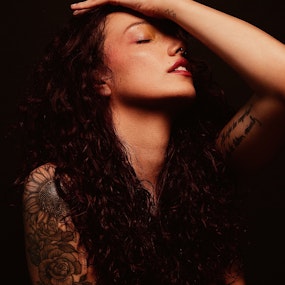
Sarah Botelho
POESY / artist, songwriter
She was discovered after she appeared on the first season of hit Canadian music competition show, THE LAUNCH. Her incredible breakout performance propelled POESY to new heights yet unseen, landing her a major label deal with Big Machine Records and an opportunity to collaborate with esteemed composer and producer Stephan Moccio (Celine Dione, Avril Lavigne) on her debut single ‘Soldier of Love.’ This release charted in the Billboard Top 40 and was followed by a four-track long EP entitled Glass Box Confessional. Her singles “Body Language” and “Strange Little Girl” debuted in the Top 20 at Rock Radio.
Her most recent project - her debut LP - I Exist - was made in collaboration with UK producer Stephen Lipson (Annie Lennox, Billie Eilish) and explores themes of betrayal and the journey back to one’s truest self. Her live show is a choir girl gone rogue – with her whimsical outfits and charming storytelling, she commands your attention and pulls you headfirst into every song.
Featured Episodes
Here are some great episodes to start with. Or, check out episodes by genre.























